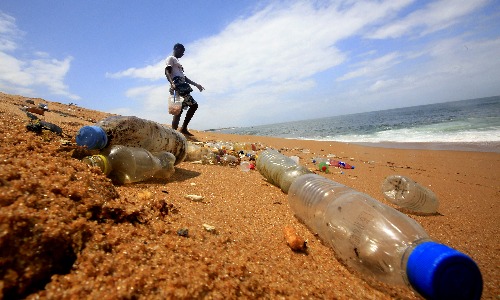ISS TODAY OP-ED
Lack of funding and coordination risk sinking Africa’s ocean protection efforts

Africa must invest in ‘life below water’ — the Sustainable Development Goal that can unlock economic and climate benefits.
Over 11 million tonnes of plastic are dumped into the world’s oceans annually, and 90% of its fish population has been fully exploited or overfished. As the planet’s ‘blue lungs’, the oceans are in dire straits and face irreversible damage.
Yet, the United Nations (UN) Sustainable Development Goal (SDG) 14 — to preserve and use the ocean’s resources sustainably — remains the least funded of all SDGs. At the halfway mark for achieving these goals, just 3.5% of total SDG financing is allocated to ‘life below water’.
Read more in Daily Maverick: Midway to the deadline for achieving Sustainable Development Goals, South Africa is not faring well
Addressing the paltry financial allocations is a global issue requiring immediate attention. African nations can show their commitment by investing greater resources in meeting SDG 14 targets.
Several global agreements point to the significance of the ocean in driving development and mitigating climate change. Estimates are that ocean-based climate solutions could contribute up to 35% of annual greenhouse gas emissions reductions. The UN’s Decade of Ocean Science for Sustainable Development (2021-2030) plan connects ocean outputs to 10 other SDGs.
But reaping these benefits requires much more money worldwide and in Africa. The World Economic Forum projects that an annual investment of $175-billion is needed to achieve global SDG14 targets by 2030.
In Africa, low levels of funding for ‘life below water’ by governments, the private sector and donors indicate that ‘seablindness’ still prevails. This is despite Africa’s blue economy already generating $300-billion and supporting about 50 million direct jobs and 12 million in the fisheries sector alone. By 2030, this could increase to over $400-billion and close to 60 million jobs.
Africa must harness the transformative potential of its oceans. The continent’s 13 million square kilometres of maritime exclusive economic zones could unlock ample development benefits. These seascapes are home to ecosystems teeming with biodiversity that form the foundation of Africa’s blue economy and need better protection.
The continent’s maritime domain is vital for its development and plays a critical role in eradicating poverty, enhancing food security and climate action. Investing in ‘life below water’ would also promote sustainable fisheries and inclusive societies.
SDG 14 emphasises the importance of sustainable fisheries — a sector vital to providing food security for 200 million Africans. By preventing the overexploitation of marine ecosystems, African countries can guarantee the future of their fishing industry and give coastal communities a reliable source of income. In countries like Namibia for example, careful resource management has led to thriving fisheries, economic growth and social equity.
However, stakeholder coordination is a major challenge in achieving SDG 14 in Africa. Effective implementation requires collaboration between governments, civil society and the private sector, but ocean governance initiatives are often fragmented and inefficient.
Collaborative ocean governance
To improve collaboration, the African Union (AU) should establish an African ocean governance advisory group to steer the AU Commission, regional economic communities, and member states. The group could develop legislative proposals and policy initiatives, and promote public-private partnerships and innovative financing mechanisms such as the ‘blue bonds’ launched by Seychelles in 2018.
Despite slow progress in other SDGs, Gabon is a global climate leader through its Green Gabon transition plan from oil dependency, which channels public and private investments into sustainable economic models. Gabon also became the latest African country to obtain blue bonds through a sovereign debt-for-nature swap in August 2023. If managed properly, the deal would be a milestone in ocean conservation, with cascading benefits for marine ecosystems and local populations.
However, the sustainable use of Africa’s maritime domain requires coordinated governance and planning. Countries must first localise the AU’s Africa Blue Economy Strategy, which has five pillars for developing the blue economy. These pillars will enable the continent to accomplish the UN Framework Convention on Climate Change’s five ocean breakthroughs by 2030 — namely marine conservation, shipping, ocean renewable energy, aquatic food and coastal tourism.
Rebecca Hubbard, High Seas Alliance Director, told ISS Today that while SDG 14 funding is limited, the challenge is as much about better governance. “[It’s about] ensuring that the money invested multiplies by delivering environmental benefits and social rewards which ultimately can even deliver more money, as opposed to bad subsidies which diminish those other values.”
Africa has the fewest deposited instruments needed to meet the two-thirds threshold for implementing the 164-member World Trade Organization deal to end harmful fishing subsidies. Yet it suffers significant financial losses due to illegal, unreported and unregulated fishing, mainly conducted by subsidised foreign long-distance vessels in its waters.
To tap into Africa’s blue economy growth potential, the AU and regional blocs should encourage member states to allocate some of their domestic climate finance budgets towards ocean initiatives.
The AU should also advocate for increased international climate finance for ocean-related projects by engaging with climate funds such as the Green Climate Fund. This can align blue economy projects at the national or regional level with global ocean governance frameworks. DM
David Willima, Research Officer, Maritime, Institute for Security Studies (ISS) Pretoria.
First published by ISS Today.


















 Become an Insider
Become an Insider
Comments - Please login in order to comment.